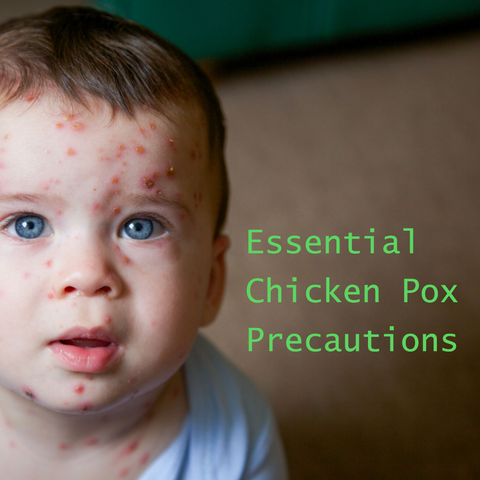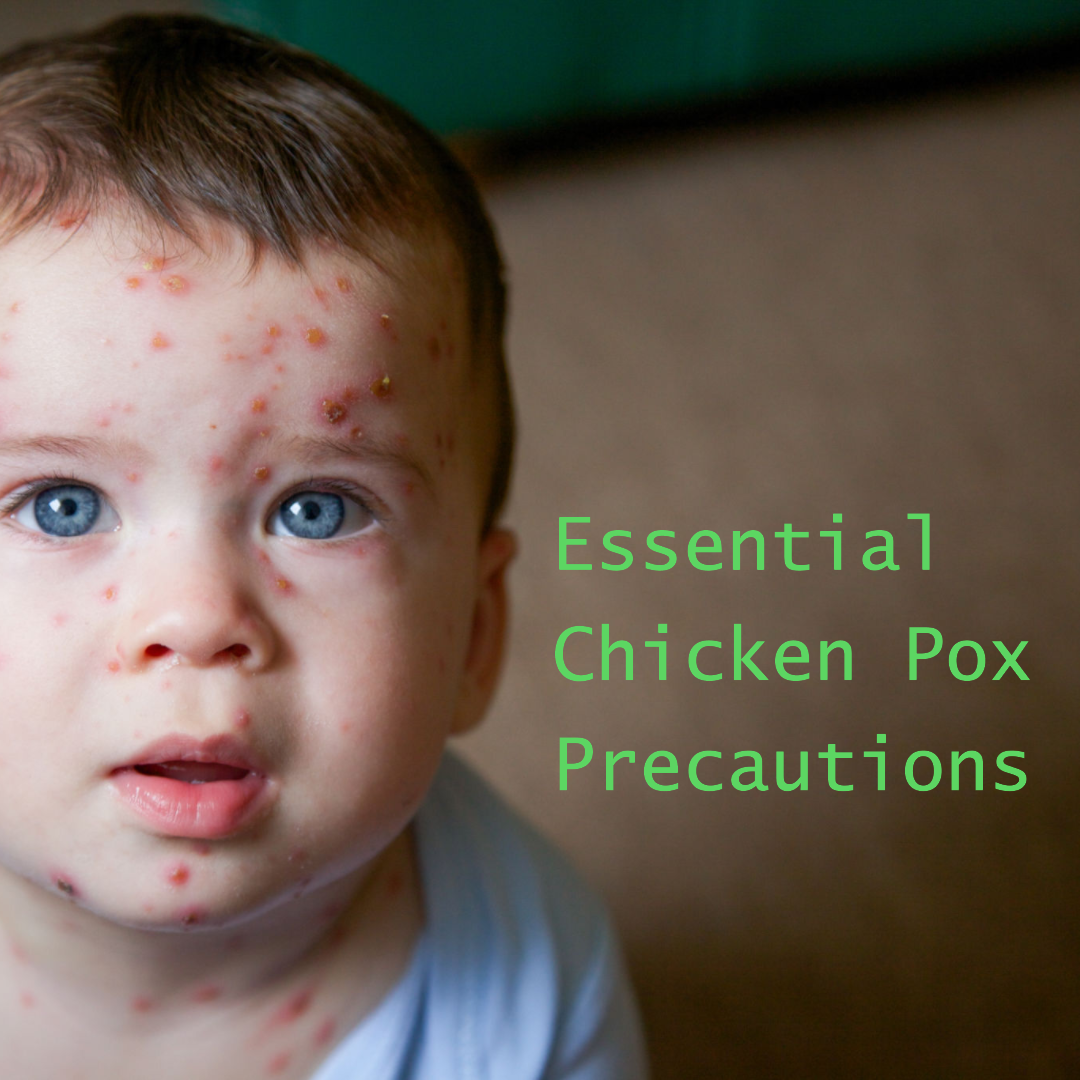Disclaimer: This article is for informational purposes only and does not constitute medical advice. Always consult with a healthcare provider for any health concerns.
Imagine waking up one morning to find your child covered in itchy red spots.
You've just entered the world of chickenpox, a highly contagious disease that can quickly turn your peaceful home into a hotbed of discomfort and stress. 
The virus, known as Varicella-zoster, doesn't just stop with one family member. It can spread like wildfire, leaving everyone scratching and miserable.
You might think it's just a matter of time before everyone in the house falls victim to this relentless virus.
But first, it's important to understand the signs and symptoms of chickenpox.
What if you could take steps to prevent the spread of chickenpox within your family, ensuring the well-being of your loved ones?
The good news is, you can.
By following these seven essential precautions, you can arm your family against chickenpox and restore peace and health to your home.
1. Isolate the Infected Person
The first and foremost step in preventing the spread of chickenpox is to isolate the infected person.
This means keeping them at home and limiting their exposure to other people, including family members.
This isolation should continue until all of their chickenpox blisters have formed scabs and no new blisters are appearing.
This is crucial because the disease is contagious from about two days before the rash appears until all the blisters have scabbed over.
During this period, the infected person should have their own room, utensils, and bathroom if possible, to minimise the risk of transmission.
If you're a working parent, you might be wondering if you can go to work if your child has chickenpox.
2. Maintain Hygiene
Hygiene plays a critical role in preventing the spread of chickenpox.
Frequent hand washing, especially after eating, using the restroom, or touching any items or surfaces, can significantly reduce the transmission of the virus.
Use warm water and soap for at least 20 seconds, ensuring all parts of the hands are cleaned.
In addition, any clothing, bedding, or soft toys that the infected person has been in contact with should be washed regularly using hot water and detergent.
This helps to eliminate the virus that may be present on these items.
It's also important to manage stress levels during a child's case of chickenpox.
3. Protect Vulnerable Individuals
Certain individuals are more susceptible to severe symptoms of chickenpox.
This includes people with a weakened immune system due to conditions like HIV/AIDS or cancer, newborn babies who haven't yet received their chickenpox vaccination, and adults who haven't been vaccinated or haven't had chickenpox.
These individuals should avoid any contact with the infected person until they are no longer contagious.
It's also important to understand whether a parent of a child with chickenpox can pass it on.
4. Keep Surfaces Clean
The chickenpox virus can survive on surfaces for a short period.
Therefore, it's important to regularly clean and disinfect objects and surfaces that the infected person may have touched.
This includes doorknobs, remote controls, mobile phones, kitchen utensils, and bathroom fixtures.
Use a sterilising solution or disinfectant wipes for this purpose.
If you're an employer, you might be interested in strategies for containing a chickenpox outbreak in your workplace.
5. Prevent Scratching
Chickenpox can cause severe itching, but scratching the blisters can lead to skin infections and can spread the virus.
To prevent this, keep children's fingernails trimmed short and consider using mittens or cotton socks over their hands, especially at night, to prevent scratching.
Soothing skin treatments can also help relieve itching. These include soaking in a bath with colloidal oatmeal, applying calamine lotion or a fragrance-free, anti-itch lotion, or using a cool compress on the skin.
6. Seek Medical Advice
If you suspect a case of chickenpox, it's important to seek medical advice. However, to prevent the spread of the virus to others, call the doctor first to let them know you will be coming in.
They might be able to make a home visit instead, or they may have specific instructions for your arrival to prevent infecting others in the waiting room.
It's also important to know when to seek medical attention for chickenpox.
7. Get Vaccinated
The most effective way to prevent chickenpox is to get the chickenpox vaccine. The vaccine is safe and over 90% effective at preventing the disease.
Everyone, including children, adolescents, and adults, should get two doses of chickenpox vaccine if they have never had chickenpox or were never vaccinated.
The vaccine not only protects the individual but also contributes to herd immunity, protecting those who cannot be vaccinated.
It's also important to understand whether chickenpox can cause a fever.
In Summary
This article provides a comprehensive guide on seven essential precautions every family should take to prevent the spread of chickenpox, a highly contagious disease caused by the Varicella-zoster virus.
The precautions include isolating the infected person, maintaining hygiene, protecting vulnerable individuals, keeping surfaces clean, preventing scratching, seeking medical advice, and getting vaccinated.
By following these steps, families can effectively manage a chickenpox outbreak, ensuring the well-being of all family members and minimising the risk of complications.
The article emphasises that prevention is always better than cure, and the best prevention against chickenpox is vaccination.
FAQs
Should grandparents stay away from grandchildren with chickenpox?
Does the whole family have to isolate if one has chicken pox?
If one member of the family has chickenpox, it is important to take precautions to prevent the virus from spreading to others (1234). The infected person should remain home and avoid exposing others who are susceptible (4). It is recommended that the person with chickenpox avoids contact with anyone who hasn’t had it and with people who have a greater risk of developing more severe symptoms (1). The infected person should also avoid contact with anyone who has a weakened immune system, newborn babies, and adults who haven't been vaccinated (1). The infected person should stay home and away from other children until all of the blisters have scabbed over (2). If someone in your household has chickenpox, you can help stop the virus spreading by wiping any objects or surfaces with a sterilising solution and making sure that any infected clothing or bedding is washed regularly (3). The most important thing is to keep the infected person in isolation until all the rash forms scabs, which usually takes about one week (5).
Can siblings go to nursery if one has chicken pox?
Chickenpox is a highly contagious virus, and most kids with a sibling who's infected will also get it (if they haven't already had the infection or the vaccine) (1). If one of the siblings has chickenpox, it's important to avoid contact with them (2). However, siblings who have been vaccinated against chickenpox can continue to go to school (2). The exclusion period for chickenpox is usually around 5-7 days, and during this period, infected children should stay home and away from other children until all of the blisters have scabbed over (23). It's hard to stop the spread of the virus due to the incubation period (4). Childminders and nurseries may allow children with chickenpox in as long as they are happy in themselves (4). However, it's worth noting that chickenpox parties are no longer recommended, as there is a small risk that your child could develop complications from the virus (2).





Share:
Calming Music for Kids with Autism: What You Need to Know
How Long Does Chicken Pox Virus Live On Surfaces?